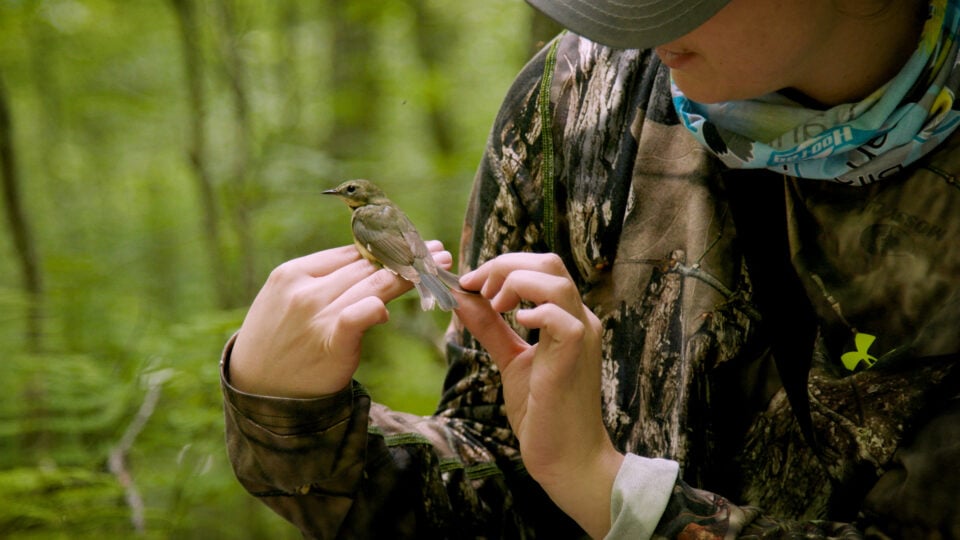By HBRF staff
March 20, 2020
See and Hear the Water Cycle with WaterViz
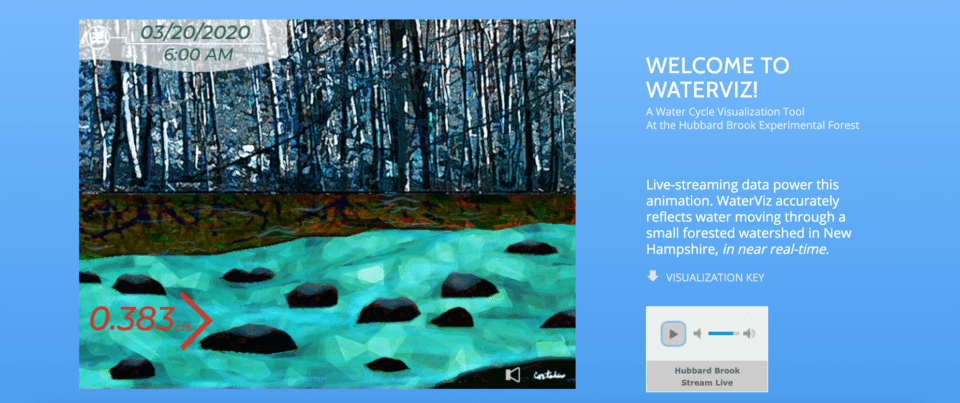
How does water flow through our forests?
How do our changing climate and land uses affect watershed dynamics?
WaterViz is a unique multimedia tool for learning about the water cycle. Hydrologic data gathered at the Hubbard Brook Experimental Forest drive a suite of online artistic visualizations and sonifications of the water cycle that reflect the hydrologic processes occurring in the forest at that moment in time. The WaterViz site includes four lesson plans under the “Teaching Tools” tab that are designed for high school or advanced middle school students.
WaterViz website:https://waterviz.org/
The Story Behind the WaterViz Project (5-minute video):https://waterviz.org/?page_id=498
WaterViz Lesson Overview:https://waterviz.org/wp-content/uploads/2018/10/WaterViz_LessonOverview.pdf
WaterViz Lessons:https://waterviz.org/?page_id=1200
Wing it with the Birds of Hubbard Brook
How are birds adapted for migration and what challenges do they face?
Each spring, Hubbard Brook comes alive with the arrival of migratory birds. Many migrate from wintering areas in the tropics to take advantage of the abundant insects and the long summer days of northern areas. Avian ecologists, scientists who study the ecology of birds, have been keeping records on the birds that live in the experimental forest for over 50 years.
Start with this stunning 10-minute video about the bird research at Hubbard Brook, shot by our friends at Northern Woodlands:
Then, students can examine the data about bird migration to New England. Background readings, links, and student worksheets are provided.
Lesson 1: http://datanuggets.org/2016/04/bye-bye-birdie-part-1/
Lesson 2: http://datanuggets.org/2016/04/bye-bye-birdie-part-2/
Settle in for Seeking the Wolf Tree Story Time
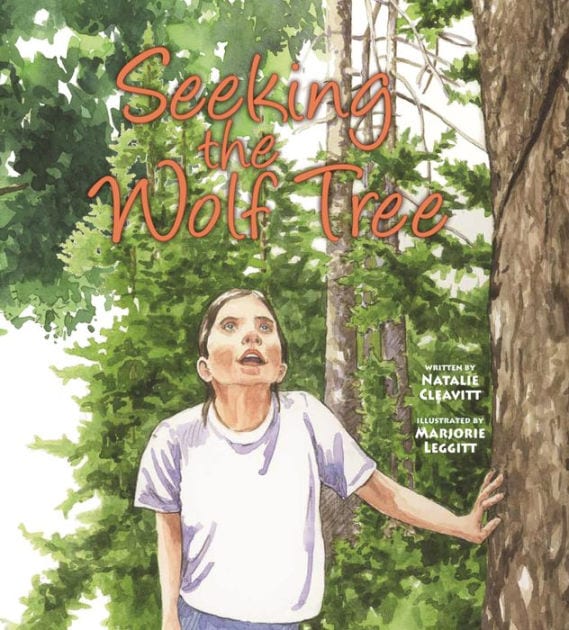
Seeking the Wolf Tree, written by Hubbard Brook scientist Natalie Cleavitt and illustrated by Marjorie Leggitt, is a story for upper elementary students about an adventure two students take through the Hubbard Brook Experimental Forest. It communicates core ideas related to the nature of science as well as energy flow and cycling of matter in ecosystems, and can serve as an intriguing introduction to a unit on ecology, or read at the beginning of the year and used as a platform for ecological concepts from which to refer back to throughout the school year.
Order Seeking the Wolf Tree from your local bookstore or Amazon, or visit the publisher’s site for the ebook. All NH public school libraries have copies.
For lessons associated with the book, see several options at: https://hubbardbrook.org/childrens-book-seeking-wolf-tree
Witness the World's First Experimental Ice Storm
Explore the Ice Storm Experiment at Hubbard Brook to learn more about extreme weather research and the ecological impacts of extreme weather in the forests of the Northeast. Scientists at Hubbard Brook created the world’s first experimental ice storms, using pumps and fire hoses to spray the forest canopy during sub-freezing temperatures. We have several videos to show what it was like during and after this unique field experiment. We also have a short Research Brief (downloadable pdf or interactive version) that gives a summary of the research and key findings. The Research Brief pdf could be printed as a handout, or the interactive online version could be a resource for high school students. Please email us if you have questions about the content and let us know how you’re using these resources for remote teaching!
About the Ice Storm Experiment:https://hubbardbrook.org/articles/ice-storm-manipulation-experiment-northern-hardwood-forest
Research Brief (Downloadable PDF):https://hubbardbrook.org/sites/default/files/documents/IceStormResearchBrief.pdf
Research Brief (Interactive):http://multimedia.hubbardbrook.org/the-ice-storm-experiment-at-hubbard-brook
Video from Science Nation:https://www.youtube.com/watch?v=UKlPbyhSK80
Get a Feel for Climate Change in the Northern Forest
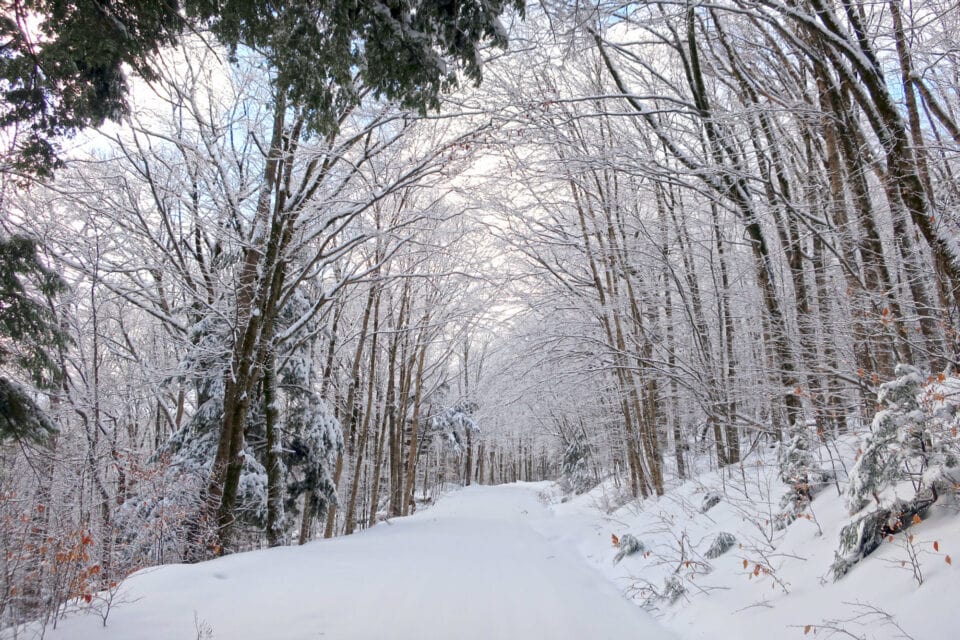
The long-term research at the Hubbard Brook Experimental Forest is a treasure trove of information about how our climate is changing in the Northeast and the impacts of those changes on forest ecosystems.
We have a 2-page Climate Change Fact Sheet (downloadable PDF) summarizing the trends in sixty years of climate and steam flow data at Hubbard Brook.
Also, the Hubbard Brook Research Foundation recently published a Science Links synthesis report about indicators of winter climate change across the entire Northern Forest region of the northeastern U.S. and eastern Canada. The links below will take you to the Science Links page where you can download the full report or individual figures, tables, and images.
A possible activity for a high school student would be to read the report and create their own powerpoint presentation using the individual figures, tables, and images.
Climate Change Fact Sheet:https://hubbardbrook.org/facts-about-climate-change
Winter Climate Change Science Links page:https://hubbardbrook.org/confronting-our-changing-winters
Confronting Our Winters full report (downloadable PDF):https://hubbardbrook.org/sites/default/files/documents/HBRF/reports/ConfrontingOurChangingWinters.pdf
Article in The Conversation about winter climate change from Hubbard Brook scientist Pam Templer:https://theconversation.com/climate-change-is-shrinking-winter-snowpack-which-harms-northeast-forests-year-round-103410
New York Times Op-Ed about the importance of winter by snowboarder Jeremy Jones:https://www.nytimes.com/2018/02/16/opinion/saving-winter-is-more-than-about-snow-its-about-jobs.html
Think Creatively with Art & Science at Hubbard Brook
Hubbard Brook is home to a growing collaboration between the arts and sciences. By working closely with forest ecologists, artists can introduce new audiences, and new sensory and emotional depths, to scientific data. Meanwhile, forest ecologists partnering with artists can explore creative ways of thinking that may influence their approach to science.
Nikki Lindt spent a week as artist-in-residence at the Hubbard Brook Experimental Forest during August 2019. While there, she worked alongside forest ecologist Lindsey Rustad to record the surprising variety of sounds that travel through the soil. “Soundscapes Beneath the Forest Floor” is part of an ongoing project called Beneath the Surface, a collection of “sound poems” recorded in various habitats that are being affected by climate change. Learn more about Nikki’s process in the above video.
Miami-based environmental artist Xavier Cortada has worked on multiple projects inspired by the long-term datasets at Hubbard Brook, including WaterViz (see above). He currently serves on Hubbard’s Brooks Committee of Scientists. Explore Xavier’s website to learn more about how he collaborates with scientists to create pieces that address sea level rise, climate change, and other environmental issues.
Soundscapes Beneath the Forest Floor:https://www.nlindt.com/soundscapes-beneath-the-forest
Xavier Cortada website:https://cortada.com/
Study Up with Our Online Ecology Textbook: A Synthesis of Scientific Research at Hubbard Brook
For advanced high school students and undergraduates, we have an online ecology textbook based on the Hubbard Brook Ecosystem Study.
Each chapter is authored by a Hubbard Brook researcher and they are updated as new science emerges.
Online textbook:https://hubbardbrook.org/online-book
Visit the Forest From Your Couch
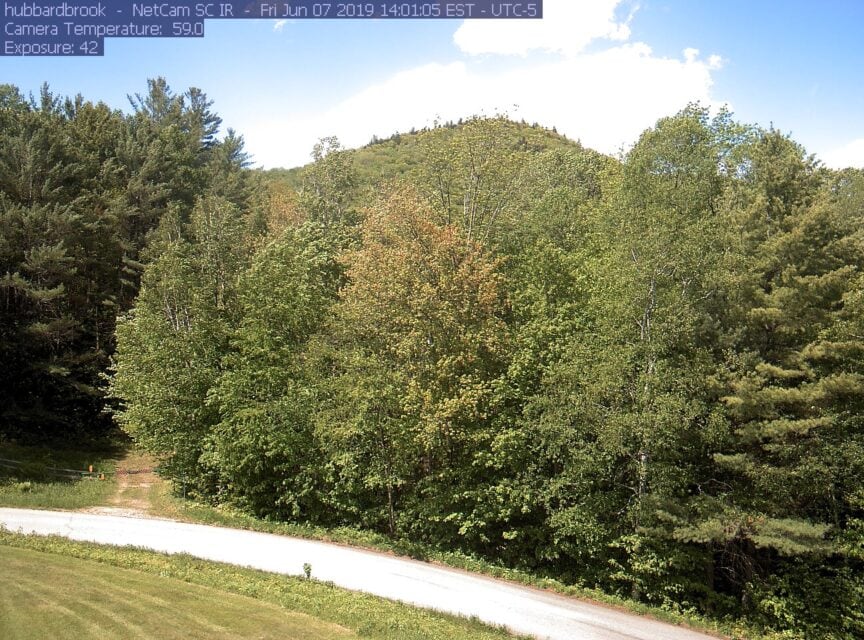
Forest Ecologist Lindsey Rustad leads a 30-minute virtual tour of the Climate Change Across Seasons Experiment at Hubbard Brook. Our webcams take daily snapshots of the forest canopy, capturing seasonal changes as they unfold. A mobile tour brings you into the forest from afar.
Virtual Tour - See Smart Forests & an Extreme Weather Experiment:https://nepris.com/share/video/k/adfe1172-083f-4fbb-a54c-a06fc270d1ba
Webcams:https://hubbardbrook.org/articles/webcams
Mobile tour:https://hubbardbrook.org/mobile-tour
Explore Our Data
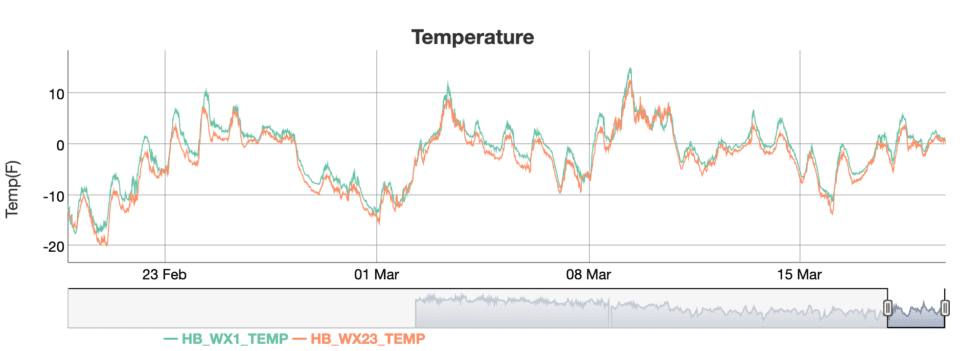
See real-time data from our network of sensors: https://hubbardbrooksensor.shinyapps.io/HBrealtime/
Check out this fantastic resource from Duke researchers sharing the long-term stream data from Hubbard Brook in an interactive dashboard:http://hbwater.org:3838/data_exploration/data_explorer_dashboard/ and Data Stories: http://hbwater.org/
Questions or comments about our resources? Send us an email at: sciencelinks@hubbardbrookfoundation.org.

